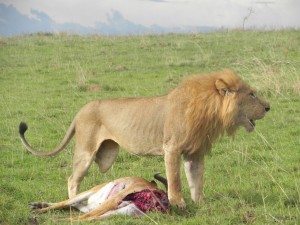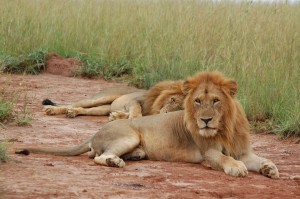If animals could speak what would they say? In the case of Clarence, the three-legged lion of Uganda, it would probably be something along the lines “rumors of my death have been greatly exaggerated.”
A fixture for many years at Murchison Falls National Park in northwestern Uganda, Clarence was the dominant male of the “Delta” pride that also included his brother “Bernie” and several females. In 2011, Clarence was caught in a poacher’s snare that severely injured one of his hind legs. Rangers of the Uganda Wildlife Authority (UWA) noticed the leg was hanging on by little more than a thin ligament. Rather than let nature take its course, the UWA made the unusual move of intervening rather than losing yet another breeding lion as a result of poaching.
Clarence was darted and operated on by the park veterinarian, who amputated the lower part of the lion’s back left leg. He was quickly released back into the wild, but park authorities had no idea if Clarence would survive or not.
But a most unusual set of circumstances unfolded. Bernie assumed leadership of the pride from his disabled brother. In addition to hunting and providing food for Clarence, Bernie also “showed incredible compassion not often documented in male lions,” says
Brian Mugume, of Adventure Consults, who has followed Clarence’s saga for many years. The females also adjusted to the change in leadership. And Clarence began to roam with the pride again. With a distinctive limp, mind you, which led rangers to dub him “Butcher-Man” after a Ugandan reggae star with a similar disability.
Two years later, tragedy struck Delta pride again. Bernie was caught in a snare and eventually suffocated to death. Wildlife experts predicted the pride would disband without strong male leadership and that Clarence’s outlook for survival was bleak at best.
But last August [2014], a vehicle came across Clarence and his ladies. “Not only was he healthy and moving around with the pride, he was actually mating,” says Corne. He was later seen feasting on a buffalo carcass. “This really is the lion that could and will survive against any odds Africa troughs at him,” Corne adds.
WCS has been monitoring lions in the park since 2010 and determined that snares are the leading cause of death for adult lions. Clarence is one of three that have been rescued by park authorities; five other big cats weren’t so fortunate.



3 Comments